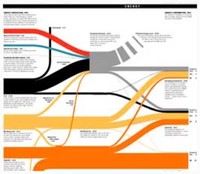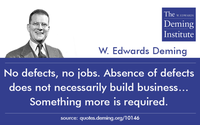Posts selected fromManagement Blog - Engineering Blog - Investing Blog and other blogs - Change is not Improvement
The Improvement Guide: the Practical Approach to Enhancing Organizational Performance, is an excellent handbook on making changes that are improvements rather than just a way to create the illusion of progress. The book uses three simple questions to frame the improvement strategy.
- What are we trying accomplish?
- How will we know that a change is an improvement?
- What changes can we make that will result in improvement?
continue reading: Change is not Improvement - Change is not Improvement
We trained hard… but it seemed that every time we were beginning to form up into teams we would be reorganized. I was to learn later in life that we tend to meet any new situation by reorganizing; and a wonderful method it can be for creating the illusion of progress while producing confusion; inefficiency, and demoralization.
These lines, from the Satyricon of Petronius written 2,000 years ago…*
* Unfortunately it seems this quote is not actually his. continue reading: Change is not Improvement - Management Excellence
Most management practices cannot be plugged into any organization and work well. That practice must be applied in a sensible way given the organizational system. Learning how lean ideas (or other good ideas) are applied in varying systems can provide insight into how to integrate ideas for organizational improvement from those applying lean practices. continue reading: Management Excellence - Management Excellence
I think the question of what other companies have management practices worth studying is interesting. The answer could be very helpful as others could learn from what those organizations do. There are at least two difficulties in identifying those organizations: 1) defining what set of criteria would indicate successful organizations 2) most often even companies that are doing many things well leave much to be desired... continue reading: Management Excellence - Zero Defects
I do not believe you succeed by declaring your goal to be zero defects. You succeed by creating a culture of never ending improvement, of customer focus, of fact based decision making, of learning, of “empowerment”…
Part of that improvement is reducing variation, reducing defects, implementing smart new mistake proofing but innovation is too. Effectively zero defects is not really achievable in most cases. Defects are largely a matter of definition. As performance improves expectations will often rise. When you eliminate anything you would have called a defect years ago, standards are higher and things that would not have been called defects are no longer acceptable. At some point the system process advances to such a level where zero defects is possible in some cases but in many (say medical care, air transportation, education, computer software, restaurants, government, management consulting, civil engineering, legal services…) I really think it is basically impossible. continue reading: Zero Defects - Great Charts
 Karl Hartig displays some excellent charts that he created (for the Wall Street Journal) on his web site. The charts seem very similar to what would result from applying Edward Tufte’s ideas. Rarely do I see charts that do such a good job of visually displaying data. The lack of such effective visual display of information is another example of how much improvement could be made just by applying ideas that are already published. continue reading: Great Charts - Zero Defects
 I agree that eliminating defects that get to customers (and even those that don’t) is wise. But I think that doing so is the result of continually improving your processes. I do not believe you succeed by declaring your goal to be zero defects. You succeed by creating a culture of never ending improvement, of customer focus, of fact based decision making, of learning... continue reading: Zero Defects - Management Improvement Leaders
- Russell Ackoff – frankly I find it difficult to imagine a list management thought leader list, not including his name. Organizational development, systems thinking, management improvement, planning, policy deployment, learning.
- George Box: statistics, design of experiments, finding solutions (problem solving, process improvement), learning, management improvement
continue reading: Management Improvement Leaders - Public Sector Management (part II)
Deming did acknowledge that the United States government was not designed to be as efficient as possible. From page 198 of Out of the Crisis “Government service is to be judged on equity as well as on efficiency.” He then quotes Oscar Ornati “We have forgotten that the function of government is more equity oriented than efficiency oriented.”
Deming did not focus on the nature of government extensively, but my recollection is that he acknowledged the wisdom of the American style of government (with checks and balances and fairly complex process for creating legislation) even though parts of that system intentionally makes change difficult. continue reading: Public Sector Management (part II) - How Not to Convert Equity
In no way does increasing their leverage convert equity that might melt away. Any amount of “melting away” will still happen after this increase in leverage – no conversion has happened. They still have a full ownership interest in the real estate. If the value of their house fell $300,000 before or after this supposed “conversion” they would “lose” (on paper) the same amount: $300,000.
...
The way to convert some of your asset to something else is to sell that asset (or a portion of it or hedge it in some way though for a house this is not easy or maybe even really possible). continue reading: How Not to Convert Equity - Customer Service is Important
My experience did not give me the impression they were focused much on what was important to me as a customers. The service I received seemed to be what I would expect from a company very focused on the idea that the objective of the company is to increase profits at the expense of everyone else. Two models of organization provide a very different customer experience. One that sees customers as fools to be fleeced seems common among USA arilines, health care providers, cable companies, large banks, car dealers and phone companies. The idea that organizations exists to provide customers value and the company takes a profit for providing that value sadly seem rare in the USA (though some organizations behave this way: Trader Joe's, many credit unions, many small restaurants and Apple (though some may disagree with me placing them here). continue reading: Customer Service is Important - Agility vs. Six Sigma
Some people dislike the idea of managing processes. In my experience they then invent the idea that slow, boring process improvement is an alternative to innovation. That is just wrong. Process improvement should be part of a well run system, as should innovation. Deming, who many believe focused only process improvement, knew the importance of both. See several of Deming’s ideas on innovation. continue reading: Agility vs. Six Sigma - Public Sector Management Using Deming's Ideas
Madison’s quality improvement efforts began after then-Mayor James F. Sensenbrenner and his staff were exposed to the teaching of W. Edwards Deming in 1983. A pilot project at the motor equipment division made substantial improvements in prioritizing repairs, improving communications with customers, reducing steps in the inventory purchasing process and, ultimately, reducing vehicle down time, all of which saved money and improved service at the same time. Based on the success of the pilot, it was decided to expand the philosophy throughout city government.
continue reading: Public Sector Management Using Deming's Ideas - Suggestions to Improve Google (2006)
I have suggested all of these for years and I still want them:
1) Let me chose the type of files searched (exclude pdfs, word, power point..). Then if I can’t find what I want I can expand to include them. At the very least give me some way of making the type much more visible (I realize it is there now but I often click before my mind notices…).
2) Let me remove web sites from my default searches. I would imagine this could even be used to help Google’s normal search results by getting a sense of sites huge numbers of people “block” The same spam sites show up for searches and I would rather block them if Google can’t figure out how to do so.
3) Let me create site search lists, where I create lists of sties I want searched – then I can target my searches how I want. Actually now that rollyo does this... continue reading: Suggestions to Improve Google (2006) - Goofy but Widespread Thinking
I can’t really understand why people seem unwilling to do the simple known things to improve performance. But there does seem to be the attitude that we need to find secret or fantastic new ideas in order to improve.
People seem to think: “I can't just read some idea in a book published 30 years ago and improve. If it were that easy everyone would be doing it.” Well it isn’t quite that easy but it is close. continue reading: Goofy but Widespread Thinking
|